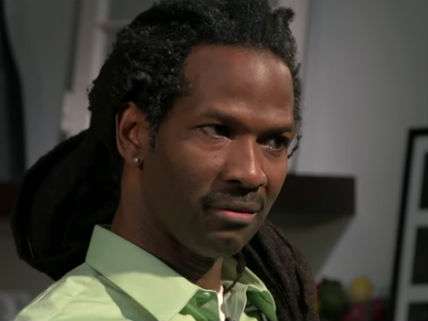'Drug Users Need Treatment,' Says President Obama. Not So Fast, Says Dr. Carl Hart
The Columbia University neuroscientist wants to shift the focus to harm reduction.


"For too long we've viewed drug addiction through the lens of criminal justice," President Obama said yesterday at a conference in Atlanta. "The most important thing to do is reduce demand. And the only way to do that is to provide treatment—to see it as a public health problem and not a criminal problem."
At least one expert totally disagrees. Earlier this month at South by Southwest Interactive (SXSWi), Columbia University neuropsychopharamacologist Carl Hart gave a talk called "Mythbusting the Drug War With Science" in which he explicitly made the case that the notion that "drug addiction is a health problem that requires treatment" is exactly the wrong way to look at the use of drugs in the United States.
"Politicians today, whether Republican or Democrat, are comfortable with saying that we don't want to send people to jail for drugs; we will offer them treatment." Hart said in Austin. But "the vast majority of people don't need treatment. We need better public education, and more realistic education. And we're not getting that."
Why does he say most people don't need treatment? Because—contrary to widespread perceptions—the vast majority of drug users aren't addicts. "When I say drug abuse and drug addiction, I'm thinking of people whose psycho-social functioning is disrupted," he said later in the talk. But for more than three-quarters of drug users (and we're not just talking about marijuana here, either), that description doesn't apply.
This overturns the conventional wisdom on drug addiction, but Hart thinks that's a good thing. We've all been fed a diet of panic-inducing misinformation about what drugs actually do to our brains, he says.
Most of us were taught that drugs like cocaine are so addictive that a rat in a laboratory experiment will continue to press a lever to receive the substance—to the exclusion of all its other physical needs—until it actually dies. Hart said at first even he believed that finding to be true. But it turns out, those studies weren't what they were cracked up to be.
"When you have the rat in a cage alone, and there's nothing else for the rat to do, the rat will repeatedly choose to take cocaine," he said. "That's logical. If the only thing you had to do in your life was press a lever to receive cocaine, what are you doing? I hope you're pressing for the cocaine."
But if additional stimuli are introduced to the environment, the finding completely falls apart.
"When you enrich the rat's environment such that you provide something like a sweet drink, or a sexually receptive mate, or some other alternative, the rat doesn't repeatedly take cocaine," he explained. "In fact, it's difficult to get the rat to self-administer or press the lever to take cocaine if you provide the rat with food!"
When he tried to replicate the experiment with drug-addicted humans instead of rats, he found they too behaved logically, choosing, say, $20 in cash as opposed to a $10 hit of coke. "This 'hijacking' of the brain's reward system, that's a nice sexy metaphor," he said. "But what we said was that cocaine addicts could not inhibit certain types of responses. They could not delay gratification. They had cognitive impairment such that they couldn't engage in this long-term planning." Yet repeatedly in tests, they did.
Once you realize that drugs don't actually rewire people's brains, making them unable to function, you can start to focus on things that matter more—like preventing overdoses. The way to do that, according to Hart, is through educational initiatives, not treatment programs.
"Now, if we are concerned about overdose deaths, we need to know how these people are dying," he said. "The vast majority [75 percent] of people who die from a heroin-related overdose do so because they combine it with another sedative, like alcohol or benzodiazepines….The public health education message is simple: If you're going to use heroin or another opioid, don't combine it with another sedative."
The message should obviously vary according to the substance in question and the population you're trying to educate. When talking to young people about marijuana, for instance, we should teach them not to start out with large doses. "And if you do and you get anxious, be cool," he said. "You're going to be OK!"
The main problem with methamphetamines, meanwhile, is that they disrupt people's sleep and reduce their food intake. "Sleep is probably the most important biological function. If you don't get enough sleep, you can get psychiatric illnesses and all types of different illnesses," he said. "So when I think about education with methamphetamines, you want to make sure people are sleeping. You want to make sure people are eating. You also want to make sure people understand the risks in terms of cardiovascular concerns: If you have a cardiovascular-compromised system, it's probably not the drug for you."
These are all examples of harm reduction, something Hart believes we need a whole lot more of. "We can help keep people safe," he said. "We haven't made much progress in this regard, but we're pretending that we are more compassionate people…by saying that we'll give them treatment."
***
Reason TV filmed a talk from Dr. Hart back in 2013. Watch the video here:


Show Comments (176)